2016 Lawyers’ Hall of Fame
Hall of Fame Class – 2016
- William B. Bankhead (1874-1940)
-
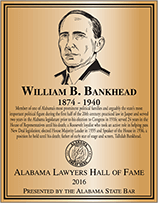
William Brockman Bankhead was an important member of one of Alabama’s most prominent families. His father, John Hollis Bankhead, Sr., was a congressman and senator for a combined total of more than 30 years and was called the “Father of Federal Good Roads” including the Bankhead Highway which extends from Washington, D.C., to San Diego. His brother, John Hollis Bankhead II, served in the United States Senate for 15 years and co-authored the Bankhead-Jones agricultural acts. His aunt, Marie Bankhead Owen, served as the director of the Alabama Department of Archives and History for 35 years. His daughter, Tallulah, was a famous actress on stage, screen and television. The honoree attained the highest ranking legislative position of any Alabamian by serving as speaker of the House for four years from 1936 to 1940.
William Bankhead was born on April 12, 1874, in Lamar County and graduated from The University of Alabama in 1892. He earned a law degree from Georgetown University in Washington, D.C., in 1895 while his father was a congressman. He returned to Alabama and practiced law in Huntsville, represented Madison County in the legislature and married Adelaide Eugenia Sledge in 1900. The couple had two daughters, however, his wife died shortly after the birth of their second daughter, Tallulah, in 1902. Bankhead later moved to Jasper, Alabama, to practice law with his brother, John. In 1916, he was elected to the United States House of Representatives and he served there until his death in 1940.
Taking advice from his father, William B. Bankhead mastered the rules of the House. And he was a loyal Democrat. He progressed through leadership positions and became an ardent supporter of President Franklin D. Roosevelt’s New Deal legislation. He particularly supported aid to farmers. In 1935, he was elected House majority leader and in 1936 he became speaker of the House. The most important bill to pass under his leadership was the Fair Labor Standards Act which established the 40-hour work week, a federal minimum wage, overtime pay for workers and the act eliminated child labor.
Bankhead sought both the presidential and vice presidential nominations in 1940, but he deferred his ambitions in loyalty to President Roosevelt. Bankhead who had suffered two previous heart attacks, died on September 15, 1940, from an abdominal hemorrhage. His funeral took place in Jasper and many political leaders, including President Roosevelt, attended the service. A grateful nation honored William B. Bankhead in 1942 by renaming the 198,000 acre Alabama National Forest as the William B. Bankhead National Forest. The lawyers of Alabama now honor him with his induction into the Alabama Lawyers Hall of Fame.
- Lister Hill (1894-1984)
-
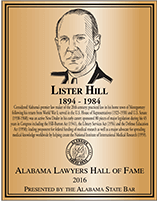 Lister Hill and his twin sister, Amelie, were born in Montgomery, Alabama, on December 29, 1894. His father, Luther Leonidas Hill, was a prominent physician in Montgomery. Hill received his undergraduate and law degrees from The University of Alabama. He also received a second law degree from Columbia University. He was admitted to the Alabama State Bar in 1916 and began his law practice in Montgomery. In the same year, he was elected to serve on the Montgomery County Board of Education.
Lister Hill and his twin sister, Amelie, were born in Montgomery, Alabama, on December 29, 1894. His father, Luther Leonidas Hill, was a prominent physician in Montgomery. Hill received his undergraduate and law degrees from The University of Alabama. He also received a second law degree from Columbia University. He was admitted to the Alabama State Bar in 1916 and began his law practice in Montgomery. In the same year, he was elected to serve on the Montgomery County Board of Education.Hill commenced his legislative career, which spanned more than 45 years, in 1922 when he was elected to the U.S. House of Representatives from the 2nd Congressional District. During his 15-year tenure in the House of Representatives, he became a New Dealer under President Franklin D. Roosevelt. He supported the Rural Telephone Act, Rural Housing Act, G.I. Bill of Rights for Veterans of World War II and the Korean War. However, he is most remembered for sponsoring the House version of the bill that created the Tennessee Valley Authority.
In 1938, Hill was elected to the U.S. Senate to fill the seat of Hugo Black who was appointed to the U. S. Supreme Court. Hill was supported by organized labor voters in the Tennessee Valley, and white, working-class Alabamians who supported President Roosevelt’s proposal to limit a work week to 40 hours and raise the minimum wage to $0.25 and then to $0.40. Senator Hill’s victory led to the passage of the Fair Labor Standards Act of 1938 which brought immediate pay raises for millions of individuals and ended child labor.
Senator Hill became the Senate majority whip within two years of his election. He also became chair of the very powerful Labor and Public Welfare Committee and chairman of the appropriations subcommittee in charge of financing the Department of Health, Education and Welfare. He was responsible for billions of dollars being allocated to the National Institute of Health of which he is considered to be the father. The Lister Hill Center at the National Health Institute is named in his honor. The Lister Hill Health Center located in Montgomery is also named in his honor. The center offers free health services or discounted health services to those who would otherwise not be able to afford those services.
Senator Hill is most remembered for co-sponsoring the 1946 Hill-Burton Act, which provided federal funding for hospital construction in localities that could not afford to build them. Under that act, more than 9,000 medical facilities were built. He also sponsored the Hill-Harris Act of 1963, which provided assistance in constructing facilities for the mentally retarded and mentally ill.
Senator Hill was a proponent of medical research and education. He was an advocate for the creation of the National Institute for International Medical Research and sponsored the Library Services Act of 1956 which authorized federal funding for libraries, as well as the National Defense Education Act of 1958 which continues to provide government assistance to improve education and provide college loans.
An issue of the New York Times stated that Senator Hill had “done more for the health of Americans in modern times than any man outside the medical profession,” and journalist William S. White wrote that Senator Hill “has done more for the public health than any American in history.”
- John Thomas King (1923-2007)
-
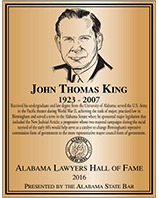 John Thomas King, Sr., was born to lead, and with politics in his blood, lead he did. Born to Circuit Judge Alta King and Donna King in Adamsville, Alabama, he was elected president of the student body at Phillips High School and later to SGA president at The University of Alabama. He interrupted his studies to serve his country in the Philippines and graduated from The University of Alabama School of Law in 1951. Just out of law school, he became an assistant U.S. attorney for the Northern District of Alabama from 1952 to 1953. During that time, he was tapped to become chief administrative assistant to U.S. Representative George Huddleston in Washington, D.C. King, while enjoying a very successful career in Washington, D.C., was sought by progressive professionals to return to Birmingham in the ’60s and run for mayor. And that he did, at great cost.
John Thomas King, Sr., was born to lead, and with politics in his blood, lead he did. Born to Circuit Judge Alta King and Donna King in Adamsville, Alabama, he was elected president of the student body at Phillips High School and later to SGA president at The University of Alabama. He interrupted his studies to serve his country in the Philippines and graduated from The University of Alabama School of Law in 1951. Just out of law school, he became an assistant U.S. attorney for the Northern District of Alabama from 1952 to 1953. During that time, he was tapped to become chief administrative assistant to U.S. Representative George Huddleston in Washington, D.C. King, while enjoying a very successful career in Washington, D.C., was sought by progressive professionals to return to Birmingham in the ’60s and run for mayor. And that he did, at great cost.Running on a platform of economic growth and prosperity for all, his vision threatened the status quo, but he was able to energize young business leaders, labor, African Americans and others who saw opportunities for Birmingham in the expansion of the UAB medical facilities and in better race relations.
Though he did not win the mayor’s chair in 1961, or again when he ran in 1963, the forces that coalesced under his vision brought a breath of fresh air that would reach full force in the 1963 Civil Rights movement and served as the catalyst for the change from the commission form of government to mayor-council form that is presently used in Birmingham.
The mayoral election had a devastating and dramatic impact on his life, but the draw of service to his community was stronger than the crushing defeats as there was so much left from his platform that he wanted to accomplish for Alabama. His political courage allowed him to run and serve as a state senator from 1971 to 1975. During his time in office, he was instrumental in sculpting the way lawyers currently practice law. He helped create the Alabama Rules of Civil Procedure which discarded the old common law pleading, and he was a staunch supporter of the nationally acclaimed Judicial Article that created the Unified Court System in Alabama. His support was critical in the passage of the bond issue that provided the funds for the State Law Center Complex at The University of Alabama School of Law. He also ensured that Alabama teachers would have group health insurance, and he wrote bills providing rehabilitation programs for juvenile offenders. He succeeded in passing legislation that allowed UAB to become the international medical facility that it is today and he made sure that if a man could fight for his country at age 18, he could also vote.
Thomas King, Sr., received many honors throughout his career, including having a highway named for him and acting as the city attorney of his hometown for more than 20 years. However, his biggest reward was having his three sons, Tom, Jr., Alan and David, practice law with him. He instilled in them, and so many others that looked up to him as a lion of the bar, that this profession is about serving others – and that his sacrifices and courage changed not only our legal profession, but all of Alabama for the better.
- J. Russell McElroy (1901-1994)
-
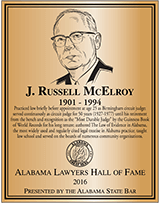 James Russell McElroy was born on October 1, 1901, in Sumter County, Alabama, and grew up in the communities of York and Cuba. He received his legal education at The University of Alabama and the Birmingham School of Law. He was in private practice and served as an assistant city attorney in Birmingham until he was appointed as circuit judge by Governor Bibb Graves in 1927. He was 25 years old.
James Russell McElroy was born on October 1, 1901, in Sumter County, Alabama, and grew up in the communities of York and Cuba. He received his legal education at The University of Alabama and the Birmingham School of Law. He was in private practice and served as an assistant city attorney in Birmingham until he was appointed as circuit judge by Governor Bibb Graves in 1927. He was 25 years old.McElroy served continuously as an active circuit court judge until his retirement in 1977 at the age of 75. His tenure as circuit judge was recognized in the 1979 in the Guinness Book of World Records as the Most Durable Judge for serving a half-century on the bench.
Judge McElroy was beloved by those who came into contact with him. He knew many lawyers and he shared his wealth of knowledge about the law with them. He taught classes at the Birmingham School of Law, The University of Alabama School of Law and the Cumberland School of Law. He was a lecturer on medical jurisprudence at the Medical College of Alabama. He was the author of Law of Evidence in Alabama, now known as McElroy’s Alabama Evidence. This book and its successor volumes, brought up-to-date regularly by Dean Charles W. Gamble, is a mainstay in the library of nearly every practicing lawyer’s office in the state.
Judge McElroy was an associate editor of The Alabama Lawyer for 18 years. He also co-authored Alabama Annotations to the Restatement of Contracts. He was a member of Kappa Alpha social fraternity, Phi Alpha Delta legal fraternity, Lions Club, member of the board of directors of the Downtown Birmingham YMCA, past-president of the Alabama Circuit Judges’ Association and he held other distinguished positions with the Alabama State Bar and the American Bar Association. He was the presiding circuit judge for the 10th Judicial Circuit in Birmingham from 1946 to 1965.
Judge McElroy always taught his classes in such a way as to retain his sense of humor to keep students’ attention and to assist them in the practice of lawyering. His expertise was in teaching students how to effectively introduce evidence, how to inform and present the evidence to a jury and how to survive the scrutiny of Appellate Courts. He helped to educate two generations of lawyers who became better lawyers because of his efforts. The lawyers of Alabama now honor him as a member of its Lawyers Hall of Fame.
- George Washington Stone (1811-1894)
-
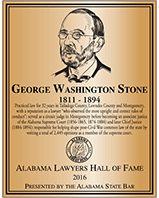 George Washington Stone was born in Bedford County, Virginia, on October 24, 1811. His parents moved to Lincoln County, Tennessee, in 1818 where his father was a planter. Stone was educated locally and then read law at Fayetteville, Tennessee. He was licensed in 1834, and that same year married Mary Gillespie of Franklin, Tennessee. Shortly thereafter, they came to Alabama and spent a few months in Coosa County. He then began a practice in Sylacauga. In 1840, he formed a law partnership with William P. Chilton in Talladega. Chilton later became chief justice of the Alabama Supreme Court.
George Washington Stone was born in Bedford County, Virginia, on October 24, 1811. His parents moved to Lincoln County, Tennessee, in 1818 where his father was a planter. Stone was educated locally and then read law at Fayetteville, Tennessee. He was licensed in 1834, and that same year married Mary Gillespie of Franklin, Tennessee. Shortly thereafter, they came to Alabama and spent a few months in Coosa County. He then began a practice in Sylacauga. In 1840, he formed a law partnership with William P. Chilton in Talladega. Chilton later became chief justice of the Alabama Supreme Court.In August 1843, Stone was appointed a circuit judge in Talladega County and served there until January 1849 when he resigned. His wife died in Talladega the previous year. Stone moved to Lowndes County and married his second wife, Emily Moore, in September 1849. In Hayneville, the county seat of Lowndes County, he had a succession of law partners, but in January 1856, he was chosen by the legislature to fill a seat on the Alabama Supreme Court. Due to this position, he moved to Montgomery where he served on the Supreme Court until 1865. Meanwhile, his second wife died in January 1862. In 1866, he married his third wife, Mary E. Wright, a widow.
Stone established a law practice in Montgomery, however, he returned to the Supreme Court in March of 1874 when Governor George S. Houston appointed him to fill a vacancy. In 1880, he was elected to a full six-year term. In 1884, Governor Emmett O’Neal appointed him as chief justice of the Supreme Court. Stone continued to serve in this capacity until his death on March 11, 1894.
Justice Stone served 28 years on the Supreme Court of Alabama, and wrote a total of 2,449 opinions. He also compiled the 1866 Penal Code of Alabama. At the time of his death, Governor Thomas G. Jones issued a proclamation paying tribute to Justice Stone which stated:
“His illustrious career as a judge, whether measured by its extraordinary length of service or the marked ability with which he disposed of new and perplexing questions has few parallels in the history of English speaking people; for during fifty years he expounded the law in times of passion and war and amid the changing scenes of revolution as well as in the calmer periods of peace. The work that he did will testify for him as long as our history lives, and will assuredly rank him among the great American judges.”
This great judge is now remembered by the lawyers of Alabama in its Lawyers Hall of Fame.